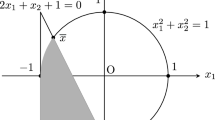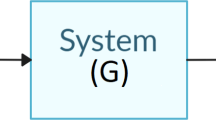Abstract
The traditional linear quadratic optimal control can be summarized as finding the state feedback controller, so that the closed-loop system is stable and the performance index is minimum. And it is well known that the solution of the linear quadratic optimal control problem can be obtained by algebraic Riccati equation (ARE) with the standard assumptions. However, results developed for the traditional linear quadratic optimal control problem cannot be directly applied to solve the problem of minimal energy control with guaranteed convergence rate (MECGCR), because the standard assumptions cannot be satisfied in the MECGCR problem. In this paper, we mainly consider the problem of MECGCR and prove that ARE can be applied to solve the MECGCR problem under some conditions. Furthermore, with the assumption that the system dynamics is unknown, we propose a policy iteration (PI) based adaptive dynamic programming (ADP) algorithm to iteratively solve the ARE using the online information of state and input, without requiring the a priori knowledge of the system matrices. Finally, a numerical example is worked out to show the effectiveness of the proposed approach.
Similar content being viewed by others
References
B. Zhou and Z. Lin, “Truncated predictor feedback stabilization of polynomially unstable linear systems with multiple time-varying input delays,” IEEE Transactions on Automatic Control, vol. 59, no. 8, pp. 2157–2163, August 2014.
C. Xia, N. Liu, Z. Zhou, Y. Yan, and T. Shi, “Steady-state performance improvement for LQR-based PMSM drives,” IEEE Transactions on Power Electronics, vol. 33, no. 12, pp. 10622–10632, December 2018.
B. Zhou and Z. Li, “Truncated predictor feedback for periodic linear systems with input delays with applications to the elliptical spacecraft rendezvous,” IEEE Transactions on Control Systems Technology, vol. 23, no. 6, pp. 2238–2250, November 2015.
H. Sun, Y. Liu, F. Li, and X. Niu, “Distributed LQR optimal protocol for leader-following consensus,” IEEE Transactions on Cybernetics, vol. 49, no. 9, pp. 3532–3546, September 2019.
F. L. Lewis, D. Vrabie, Optimal Control, 3rd Edition, John Wiley & Sons, Inc., 2013.
D. Kleinman, “On an iterative technique for Riccati equation computations,” IEEE Transactions on Automatic Control, vol. 13, no. 1, pp. 114–115, February 1968.
G. Tao, Adaptive Control Design and Analysis, Wiley-IEEE Press, 2003.
I. Mareels, J. Polderman, “Adaptive systems,” Systems & Control Foundations & Applications, vol. 12, no. 1, pp. 1–26, 1996.
Y. Jiang, J. Fan, T. Chai, J. Li, and F. L. Lewis, “Data-driven flotation industrial process operational optimal control based on reinforcement learning,” IEEE Transactions on Industrial Informatics, vol. 14, no. 5, pp. 1974–1989, May 2018.
H. Zhang, Y. Liu, G. Xiao, and H. Jiang, “Data-based adaptive dynamic programming for a class of discrete-time systems with multiple delays,” IEEE Transactions on Systems, Man, and Cybernetics: Systems, 2017. DOI: 10.1109/TSMC.2017.2758849
C. Li, D. Liu, and D. Wang, “Data-based optimal control for weakly coupled nonlinear systems using policy iteration,” IEEE Transactions on Systems, Man, and Cybernetics: Systems, vol. 48, no. 4, pp. 511–521, April 2018.
B. Luo, Y. Yang, and D. Liu, “Adaptive Q learning for data-based optimal output regulation with experience replay,” IEEE Transactions on Cybernetics, vol. 48, no. 12, pp. 3337–3348, December 2018.
S. Zuo, Y. Song, F. L. Lewis, and A. Davoudi, “Optimal robust output containment of unknown heterogeneous multiagent system using off-policy reinforcement learning,” IEEE Transactions on Cybernetics, vol. 48, no. 11, pp. 3197–3207, November 2018.
D. Vrabie, O. Pastravanu, M. Abu-Khalaf, and F. L. Lewis, “Adaptive optimal control for continuous-time linear systems based on policy iteration,” Automatica, vol. 45, no. 2, pp. 477–484, February 2009.
H. Modares and F. L. Lewis, “Linear quadratic tracking control of partially-unknown continuous-time systems using reinforcement learning,” IEEE Transactions on Automatic Control, vol. 59, no. 11, pp. 3051–3056, November 2014.
H. Wu and B. Luo, “Simultaneous policy update algorithms for learning the solution of linear continuous-time H ∞ state feedback control,” Information Sciences, vol. 222, no. 10, pp. 472–485, February 2013.
Y. Jiang and Z. Jiang, “Computational adaptive optimal control for continuous-time linear systems with completely unknown dynamics,” Automatica, vol. 48, no. 10, pp. 2699–2704, October 2012.
H. Zhang, J. Zhang, G. Yang, and Y. Luo, “Leader-based optimal coordination control for the consensus problem of multiagent differential games via fuzzy adaptive dynamic programming,” IEEE Transactions on Fuzzy Systems, vol. 23, no. 1, pp. 152–163, February 2015.
W. Gao, Z. Jiang, F. L. Lewis, and Y. Wang, “Leader-to-formation stability of multiagent systems: an adaptive optimal control approach,” IEEE Transactions on Automatic Control, vol. 63, no. 10, pp. 3581–3587, October 2018.
Y. Jiang, B. Kiumarsi, J. Fan, T. Chai, J. Li, and F. L. Lewis, “Optimal output regulation of linear discrete-time systems with unknown dynamics using reinforcement learning,” IEEE Transactions on Cybernetics, 2019. DOI: 10.1109/TCYB.2018.2890046
S. He, J. Song, Z. Ding, and F. Liu, “Online adaptive optimal control for continuous-time Markov jump linear systems using a novel policy iteration algorithm,” IET Control Theory & Applications, vol. 9, no. 10, pp. 1536–1543, 2015.
Y. Fu, J. Fu, and T. Chai, “Robust adaptive dynamic programming of two-player zero-sum games for continuous-time linear systems,” IEEE Transactions on Neural Networks and Learning Systems, vol. 26, no. 12, pp. 3314–3319, December 2015.
H. Li, D. Liu, and D. Wang, “Integral reinforcement learning for linear continuous-time zero-sum games with completely unknown dynamics,” IEEE Transactions on Automation Science and Engineering, vol. 11, no. 3, pp. 706–714, July 2014.
T. Kaczorek, “Minimum energy control of positive fractional descriptor continuous-time linear systems,” IET Control Theory & Applications, vol. 8, no. 4, pp. 219–225, Mar 2014.
T. Kaczorek, “Minimum energy control of fractional positive electrical circuits with bounded inputs,” Circuits Systems & Signal Processing, vol. 65, no. 2, pp. 191–201, Mar 2014.
J. L. Willems, “Minimum energy and maximum accuracy optimal control of linear stochastic systems,” International Journal of Control, vol. 22, no.1 pp. 103–112, 1975.
M. Stocks and A. Medvedev, “Guaranteed convergence rate for linear-quadratic optimal time-varying observers,” Proceedings of the 45th IEEE Conference on Decision and Control, pp. 1653–1658, 2006.
C. T. Chen, Linear System Theory and Design, Holt, Rinehart, and Winston, 1984.
B. Anderson and J. Moore, “Linear system optimization with prescribed degree of stability,” Proceedings of the Institution of Electrical Engineers, vol. 116, no.12, pp. 2083–2087, 1969.
K. Zhang and S. Ge, “Adaptive optimal control with guaranteed convergence rate for continuous-time linear systems with completely unknown dynamics,” IEEE Access, vol. 7, pp. 11526–11532, 2019.
B. Zhou, G. Duan, and Z. Lin, “A parametric Lyapunov equation approach to the design of low gain feedback,” IEEE Transactions on Automatic Control, vol. 53, no. 6, pp. 1548–1554, July 2008.
B. Zhou and G. Duan, “Periodic Lyapunov equation based approaches to the stabilization of continuous-time periodic linear systems,” IEEE Transactions on Automatic Control, vol. 57, no. 8, pp. 2139–2146, August 2012.
B. Zhou, G. Duan, and Z. Lin, “Approximation and monotonicity of the maximal invariant ellipsoid for discrete-time systems by bounded controls,” IEEE Transactions on Automatic Control, vol. 55, no. 2, pp. 440–446, February 2010.
A. J. Laub, Matrix Analysis for Scientists and Engineers, Society for Industrial and Applied Mathematics, 2004.
P. A. Ioannou and J. Sun, Robust Adaptive Control, Prentice-Hall, Inc., 1995.
I. Mareels and J. W. Polderman, Adaptive Systems: An Introduction, DBLP, 1996.
Y. Jiang and Z. Jiang, Robust Adaptive Dynamic Programming. Reinforcement Learning and Approximate Dynamic Programming for Feedback Control, John Wiley & Sons, Inc., 2013.
W. Gao and Z. Jiang, “Learning-based adaptive optimal tracking control of strict-feedback nonlinear systems,” IEEE Transactions on Neural Networks and Learning Systems, vol. 29, no. 6, pp. 2614–2624, June 2018.
J. Fan, Z. Li, Y. Jiang, T. Chai, and F. L. Lewis, “Model-free linear discrete-time system H ∞ control using input-output data,” Proc. of International Conference on Advanced Mechatronic Systems, pp. 207–212, 2018.
Author information
Authors and Affiliations
Corresponding author
Additional information
Publisher’s Note Springer Nature remains neutral with regard to jurisdictional claims in published maps and institutional affiliations.
Recommended by Associate Editor Hyun Myung under the direction of Editor PooGyeon Park.
Kai Zhang received his B.S. degree in automation in 2016 from Hefei University of Technology, Anhui, China, where he is currently pursuing an M.S. degree in control theory and control engineering. His research interests include reinforcement learning, adaptive dynamic programming, optimization and game theory.
Suoliang Ge received his M.S. degree in control theory and control engineering from Hefei University of Technology, Anhui, China. His research interests include adaptive dynamic programming, optimization and game theory.
Yuling Ge received her B.S. degree in automation in 2018 from Hefei University, Anhui, China. Now she is pursuing an M.S. degree in control theory and control engineering from Hefei University of Technology, Anhui, China. Her research interests include neural networks, adaptive dynamic programming, deep learning.
Rights and permissions
About this article
Cite this article
Zhang, K., Ge, S. & Ge, Y. Adaptive Dynamic Programming for Minimal Energy Control with Guaranteed Convergence Rate of Linear Systems. Int. J. Control Autom. Syst. 17, 3140–3148 (2019). https://doi.org/10.1007/s12555-019-0083-8
Received:
Revised:
Accepted:
Published:
Issue Date:
DOI: https://doi.org/10.1007/s12555-019-0083-8




